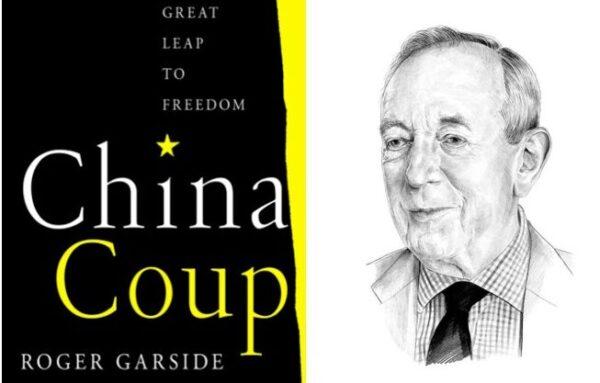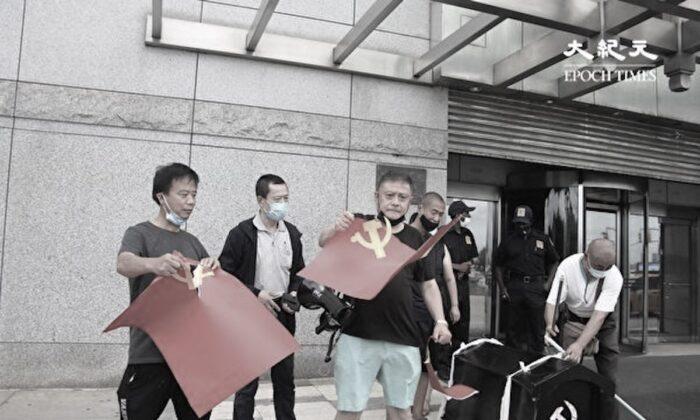Commentary
Xi Jinping is a modern-day tyrant. A number of world leaders would love nothing more than to see the leader of China removed from office. For that to happen, a coup is necessary.
According to Roger Garside, a man who spent years working as a diplomat in China, the days of the one-party dictatorship may be coming to an end. In his latest book, “China Coup: The Great Leap to Freedom,“ Garside argues that, contrary to popular belief, Xi Jinping may very well be removed from office ”in a coup d’état mounted by rivals in the top leadership.“ Shortly after the removal of Xi, the leaders of the coup will bring an end to ”China’s one-party dictatorship and launch a transition to democracy and the rule of law.”
As far-fetched as this might sound, Garside believes that the West can help the Chinese people remove Xi from office.
In a telling interview with Voice of America (VOA), Garside suggests that “the U.S. and its allies” have a distinct advantage over China. Now, though, their “economic superiority” must be leveraged “to bring about regime change.”
Although Joe Biden, Boris Johnson, Emmanuel Macron, and other world leaders can’t “decide from outside how China shall be governed,” there are a number of individuals “within China” who want to bring about change. It is up to America and its Western allies to “help those people” and “work to bring about conditions in which they can achieve what they want.”

Garside believes that if “China’s second-ranking official,” Li Keqiang, along with “like-minded leaders,” were to challenge the leader, “they would not be without public support.” Is Garside accurate in his beliefs? As someone who has covered Chinese affairs extensively, I think so. Xi Jinping is effectively a king without a crown. If history (and Game of Thrones) has taught us anything, it’s that a king’s position is always under threat. To quote Shakespeare, “uneasy is the head that wears a crown.” If Garside’s assumptions prove to be correct, a Shakespearean tragedy awaits Xi.
Removing Xi
There is more than one way to remove Xi. British politician Clive Lewis once said, rather accurately, that a coup needn’t be a coup d’état. The removal of a tyrant “doesn’t always require tanks on a lawn and senior ranking military types appearing on your TV and radio.” Although, considering China’s history, violence would most certainly play a role. For an effective coup to occur, be it violent or otherwise, the people must be mobilized. This shouldn’t be a problem. In February, Xi announced that the Chinese regime had successfully defeated extreme poverty; the evidence, however, suggests otherwise. Around 600 million Chinese, or almost half the country’s population, live on less than $5 a day. As events in South Africa have clearly demonstrated, desperate people are capable of desperate things. Right now, in China, hundreds of millions of people are desperate. As the gap between the rich and poor continues to grow, it would be foolish of Xi to expect the Chinese people, especially the more rebellious youth, to sit idly by.Should Xi be worried? Most definitely. According to a recent Geopolitical Futures report, “the decline of China’s competitiveness in the export market” is a reality that the leader must reckon with. High unemployment, already a major issue in the country, will become a “significant challenge to the Chinese president.” The authors suggest that the regime “will attempt to survive the economy’s downward spiral” by doing the one thing, and the only thing, it knows how to do: by “tightening its grip on power and sliding back into dictatorship.” Although this method has worked in the past, it won’t work in the future. As the report states,“the regional divergences in China are too widespread and not easily suppressed by dictatorship.” By 2040, “China will see a return to regionalism, accompanied by turmoil.” With China’s weakening grip, both at home and abroad, “a power vacuum will emerge in East Asia, which will be filled by Japan.”
Xi would do well to read this report, because it outlines a future in which both he and China fail. If the country spirals into chaos, Xi will be held responsible. He will also face the wrath of 1.4 billion people, many of whom have been left behind. What lies in store for the leader remains to be seen, but let’s hope Garside’s prognostications prove to be accurate.
In China, through the dissemination of non-stop propaganda, Xi, to a large extent, has a monopoly on truth. But he doesn’t have a monopoly on geopolitical and economic realities. With China’s population still growing, and less food to go around, existential crises await the nation. The people are restless, opportunities are scarce, and tensions are mounting. If the Chinese people are to have a better future, a coup is most definitely required.
Views expressed in this article are opinions of the author and do not necessarily reflect the views of The Epoch Times.






Friends Read Free